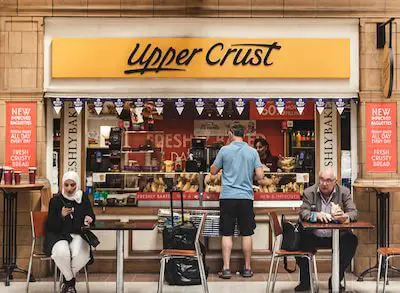‘Upper crust’ means aristocratic; socially superior.
Upper crust
What's the meaning of the phrase 'Upper crust'?
What's the origin of the phrase 'Upper crust'?
‘Upper crust’ is one of those phrases that people, and especially those people who make a living as tour guides, will gladly explain the etymology of. Advance within twenty yards of any English manor house that has medieval kitchens and you can’t avoid hearing that ‘upper crust was the superior, unburned part of a loaf that was served to the gentry’. Nice idea, but that’s all it is, an idea; it may be true but there’s no documentary evidence to support it. This piece of folk wisdom is part of the collection of twaddle that has done more to spread false phrase etymologies than anything else. This is circulated by email on the Internet, under the name of ‘Life in the 1500s‘. For those that persist in believing the above story, its place on that list of falsehoods isn’t exactly encouraging, but let’s not judge a book by its cover and look at the evidence.
As I’ve said there’s no real evidence in favour of the ‘top of the bread’ derivation. The nearest we can come to that is the earliest known example of the term in print, which does make an oblique connection between the top part of a loaf and the nobility. This is from John Russell’s The boke of nurture, folowyng Englondis gise, circa 1460:
Kutt ye vpper crust for youre souerayne. (that is, Cut the upper crust [of the loaf] for your sovereign)
There’s a wide gulf between that citation and the idea that only the aristocracy were given the upper crust of loaves to eat.
The link between ‘upper-crust’ and bread, although tenuous, is firmly fixed in the popular imagaination and the expression is a favourite of bread shops worldwide.
The term ‘upper crust’ didn’t in fact come to be used figuratively to refer to the aristocracy until the 19th century. The earliest citation that I can find of the term with that meaning is in Slang: A Dictionary of the Turf, by John Badcock, 1823:
“Upper-crust – one who lords it over others, is Mister Upper- crust.”
The term had previously been used to refer to the outer crust of the Earth’s surface and, more frequently, a person’s head or hat. That latter use was still in use when the ‘aristocracy’ meaning was coined, as is shown by this entry from an edition of Grose’s Classical Dictionary of the Vulgar Tongue, which was published in the same year as the above reference, 1823:
…but to hear it from the chaffer [mouth] of a rough and ready costard-monger, ogling his POLL from her walker [feet] to her upper crust [head].
Incidentally, costard-monger was the earlier name for costermonger – a street trader who sells greengrocery from a stall or barrow. A costard was the 14th century name for a type of large, ribbed apple and later came to be the name given to apples in general. A costard-monger was initially an apple-seller.
The ‘Earth’s surface’ and ‘head/hat’ meanings connect ‘upper crust’ with ‘top’ and there’s every reason to believe that our present application of the term to members of society is another use of that same metaphor. The connection between the ‘upper crust’ of society and the upper crust of loaves of bread is fanciful.
The history of “Upper crust” in printed materials
Trend of upper crust in printed material over time
Browse more Phrases
About the Author

Phrases & Meanings
A-Z
A B C D E F G H I J K L M N O P Q R S T UV W XYZ
Categories
American Animals Australian Bible Body Colour Conflict Death Devil Dogs Emotions Euphemism Family Fashion Food French Horses ‘Jack’ Luck Money Military Music Names Nature Nautical Numbers Politics Religion Shakespeare Stupidity Entertainment Weather Women Work
How did we do?
Have you spotted something that needs updated on this page? We review all feedback we receive to ensure that we provide the most accurate and up to date information on phrases.
